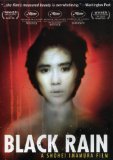| Reviews & Columns |
|
Reviews DVD TV on DVD Blu-ray 4K UHD International DVDs In Theaters Reviews by Studio Video Games Features Collector Series DVDs Easter Egg Database Interviews DVD Talk Radio Feature Articles Columns Anime Talk DVD Savant Horror DVDs The M.O.D. Squad Art House HD Talk Silent DVD
|
DVD Talk Forum |
|
|
| Resources |
|
DVD Price Search Customer Service #'s RCE Info Links |
|
Columns
|
|
|
Black Rain (Kuroi ame)
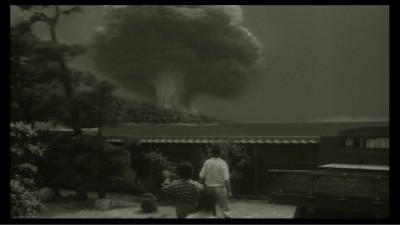
Black Rain (Kuroi ame) begins on the morning of August 6, 1945. It's a hot, but otherwise typical, Monday morning. An air raid siren sounded before dawn, but the all clear has already been given. By eight a.m. the inhabitants of Hiroshima, including the Shimizu family, are beginning the last ordinary morning of their lives. Shigematsu Shizuma (Kazuo Kitamura), a late-middle-aged officer in Japan's home guard is on his way to his management job at a local factory, his wife Shigeko (Etsuko Ichihara) is at home, and their niece Yashiko (Yoskiko Tanaka) is across the bay visiting family.
At 8:15 and thirty seconds, a single atomic bomb will fall on the city killing 80,000 men, women and children outright, and leveling two-thirds of the structures in the city in the initial blast wave and subsequent firestorm. Within a year, another 10,000-50,000 more will sicken and die of radiation poisoning, and untold more will follow in the years thereafter.
For now, the Shimizu family is luckier than most. All survive the immediate blast and find one another quickly. Though it's unclear to them what could have caused such complete and utter destruction so instantly, together, they make their way through the devastated city, past the scorched bodies of those killed outright and the writhing bodies of the less fortunate - those burnt beyond recognition who can only wish that they'd been spared the slow, agonizing deaths ahead of them.
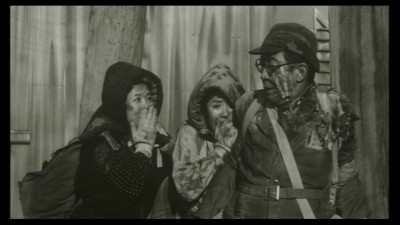
The first fifteen minutes of Black Rain are consumed with horrific scenes of hell on earth. If you're an American, it's impossible to watch this without feeling some degree of culpability regardless of when you were born or what you believe about the moral and pragmatic justifications for the attack. But assigning wartime blame is not the aim of filmmaker Shohei Imamura. This destruction is merely the prelude to a more complicated story about the physical and psychological aftermath of this terrible day in the waning summer of '45.
Five years later, a post-war Japan is trying to forget its past. Ex-soldiers suffering untreated psychological wounds (what we'd now call PTSD) and civilians with radiation-induced illnesses are equally mistrusted and shunned by their neighbors. The Shimizu family has returned to its ancestral village in the mountains outside the city. Like his two best friends, Shigematsu suffers from radiation sickness, but his wife and niece seem healthy. When the story picks up, Yashiko is twenty-five-years-old and, alas, still unmarried. Although her uncle has obtained a health certificate declaring that she is completely well, the families of prospective suitors view her as potentially damaged goods, and it seems she may see herself this way too.
Without giving away the fate of the Shimizu clan or of their friends, it's safe to say that there's enough misfortunes and reversals ahead to test the virtue of Job, yet whether one gives in and gives up, or stoically adjusts and carries on remains a matter of personal prerogative. However, Imamura refrains from trite moralizing and from providing a narratively proscriptive ending, leaving it to the viewer to imagine their own conclusions, at least in this version of the film (but a more prescriptive alternative post-script is offered in the extras).
Reportedly, Black Rain was filmed in black and white because the scenes of destruction were deemed too upsetting to show in color, but whatever the reason, the low-contrast, black and white makes Black Rain look much older, and consequently even more daring, than it actually is. Further, whether intentional or not, the scenes of family drama are often staged and framed in a manner reminiscent of Ozu's family dramas from the '50s. The cumulative effect is to reference those earlier dramas about families under pressure to conform to traditional expectations while being pulled by modern currents, while upping the ante considerably by attaching the physical burden and social stigma of lurking radiation-illness.
Presentation
Video & Audio:
In his 1990 review of the theatrical release, film critic Roger Ebert noted the "beautifully textured black and white" of the film. Unfortunately, the low-contrast, high grain, black-and-white image (2.35:1) on the DVD doesn't compare favorably with what Ebert seems to have seen. The low-contrast image is dark and a bit soft, though it is far better than that provided on the long out-of-print 1998 DVD release from Image Entertainment.
The Japanese stereo audio also sounds older than its twenty years. There's a soft hiss throughout, occasional pops and crackles, and mild distortion at the upper range, but as with the image the practical effect is merely to make Black Rain seem older than its twenty years.
Optional English subtitles are available in Yellow/Green and White/Grey for either just dialogue, just captions, or both. Per norm, the subtitles offered by AnimEigo are exemplary in terms of translation and depth of information conveyed.
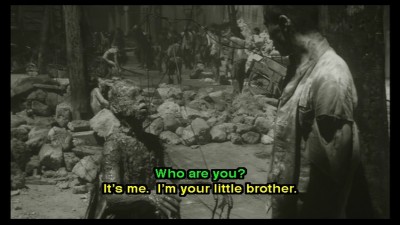
Extras:
This release sports a nice mix of extras which include a nineteen-minute alternative color ending, new interviews with assistant director Takashi Miike (8:01), who's gone on to a storied career of his own, and lead actress Yoshiko Tanaka (6:38), fifty minutes of archival American propaganda, two image galleries, cast/crew bios, extensive program notes, and the theatrical trailer.
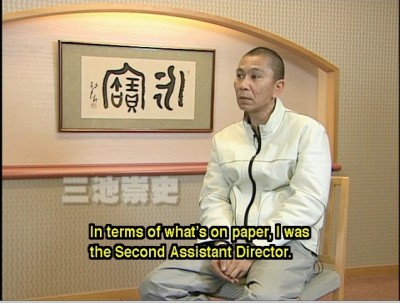
Final Thoughts:
Shohei Imamura 's Black Rain (Kuroi ame) is an exceptional dramatic consideration of the immediate and lingering physical and psychological injuries caused in the first instance by the atomic bomb, and exacerbated by the collective distrust of, and aversion to, those not killed outright by their own compatriots and neighbors. Though the visual and audio quality is less than one might expect from a film only twenty years old, this new DVD release from AnimEigo is a vast improvement over the 1998 release from Image Entertainment.
|
| Popular Reviews |
| Sponsored Links |
|
|
| Sponsored Links |
|
|
| Release List | Reviews | Shop | Newsletter | Forum | DVD Giveaways | Blu-Ray | Advertise |
|
Copyright 2024 DVDTalk.com All Rights Reserved. Legal Info, Privacy Policy, Terms of Use,
Manage Preferences,
Your Privacy Choices | |||||||









